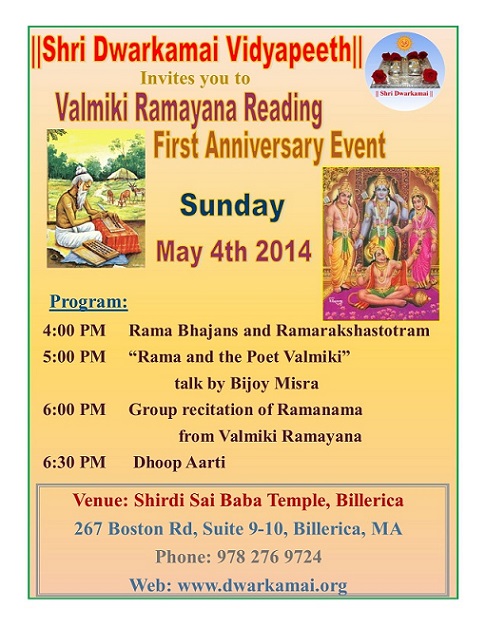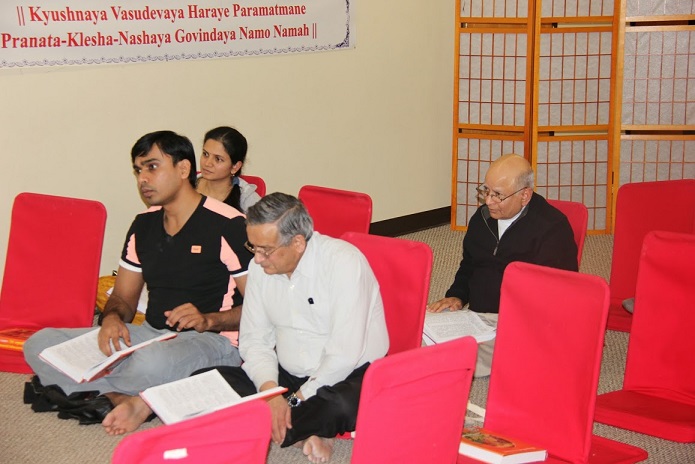Contribute
| Valmiki Ramayana At Dwarkamai Vidyapeeth |
Kaladhar Rao Tenneti
04/24/2014
For a year now, between six to a dozen of us have been meeting twice monthly under the leadership of Sri Bijoy Misra at Dwarkamai Vidyapeeth to read the immortal composition Ramayana of Valmiki. While we began as a Sanskrit pÄrÄyaṇa exercise, lately we take time out to pause, reflect and interpret the writing to learn the nuances of our culture as observed and depicted by Valmiki. We marvel at the elegance of the wordplay, the rhythm and diction. Some poet has commented that there is nothing in the world equals to the narrative poetry of Ramayana and we immerse ourselves in the narration. It has been the most novel experience of our adult life for most of us. We have had twenty sessions in the year. Misraji is making efforts to translate the material in each session and archive in a blog http://misrabijoy.wordpress.com.
We are organizing an anniversary event to mark the one-year completion of our effort on Sunday, May 4, from 4 PM to 6:30 PM. We begin with the group recitation of RÄmaraká¹£Ästotram and follow up with the singing of Rama bhajans. Misraji will offer a talk entitled 'Rama and the poet Valmiki' after which we would do a group recitation of the 108 names of Rama as coined by Valmiki. At 6:30 PM we would have the regular Arati in the Temple and then we would have prasadam. I have the pleasure of inviting all devotees to join us in this special event. The program announcement is at
http://vidyapeeth.dwarkamai.org/events/events-calendar-view?task=view_event&event_id=250.
Ramayana reading sessions are announced in Dwarkamai Vidyapeeth calendar and we invite all Ramapremis to join us. Books in Devanagari script are available in the Temple. We are procuring books in Telugu script. We are thankful to the volunteers at Dwarkamai Vidypaeeth and its mentor Sri Anil Naik for the cooperation and support. Shirdi Sai is our inspiration and we feel blessed by his presence in our readings.
I also wish to take the opportunity to share my personal impressions through the year’s journey. We learned a lot from reading the original and many misconceptions are slowly being removed. Whenever doubts arise in Ramayana, it is always better to refer to the original by Valmiki. As a poet, the greatness of Valmiki is visible in every episode. His character analysis of persons and dialogues between individuals indicate deep understanding of human emotions. He was a Rá¹£i, who by his intense tapas and sÄdhanÄ got the blessings from Brahma and Sarasvati and from the divine sage Narada. With such blessing, he is able to comprehend the things going on in the mind of each and every individual character in Ramayana. There are a few differences between the original and subsequent renderings of the story colored by new authors or preferences. Valmiki presents Rama as a perfect example of how a human being must behave. Reading Ramayana helps us to mould our lives better and to make necessary adjustments and course corrections in the way we live our life.
A few features came to attention:
(1) The first one is regarding the distribution of pÄyasa by King Dasaratha among his three queens. He gave half (1/2) of that to Kausalya, the eldest queen; one quarter (1/4) to Sumitra his second queen; and 1/8 to Kaikeyi, his beloved third queen; and the final (1/8) again back to Sumitra.
(2) Kausalya gave birth to Rama, Kaikeyi gave birth to Bharata and Sumitra gave birth to the twins of Lakshmana and Satrughna. All the princes were born at a time when five planets (Ravi, Guru, Kuja, Sukra and Sani) were in exalted positions. According to astrology, paṇcocce lokanÄyakaḥ. All of them became exemplary individuals. Only the Lagna, the birth star and tithi were different. Rama’s Lagna was Karkataka, Punarvasu 4th padam and Navami tithi. Bharata’s were meena lagna (approximately sixteen hours later in pushyami nakshatra. The twins were born some eight hours later, where the lagna is again karkataka, tithi is dasami and aslesha nakshatram. All the astronomical and astrological details are given by Valmiki. It is very interesting to note that Raghu Maharaja, an ancestor in the same Ikshvaku dynasty also had five planets in exalted position at the time of birth.
(3) The story of Kusanabha and his daughters is interesting. After seeing the daughters of Kusanabha, Vayudeva wanted to marry them and the reply given to him by them is ideal for all daughters. That is how a culture starts to take shape. Valmiki shapes it.
asya no dÄsyati pitÄ sa no bhartÄ bhaviá¹£yati ||
(4) SÅ«rpaṇakhÄ is not the first demon to get her nose and ears chopped off by Lakshmana. He did the same thing to TÄá¹akÄ on being instructed by Rama.
(5) The story of Viswamitra pursuing the status of Brahmarshi is inspiring. He spent all his power acquired by intense tapas on pursuing mundane things like trying to take Nandini from Vasishtha by force, trying to send the king Trisanku to heaven in physical body. He then yielded to the temptations offered by Menaka. The lesson to be learned here is that he did not give up his austerities and practice of tapas in spite of many failures. His perseverance led him finally to his goal of the status of Brahmarsi.
(6) Another great king in the same solar dynasty is King Bhagiratha, who is an inspiring example of single-pointed goal-oriented and persevering individuals. His life’s ambition was to bring Gaá¹gÄ to the earth and then take to PÄtÄla to save his great grandfathers from their curse.
(7) There is a prevailing opinion about Indra that he wants to cling on to his divine throne and creates hurdles and problems to anyone trying to do intense tapas. He makes the horse of King Sagara disappear, send Menaka to disturb the tapas of Sage Viswamitra, tests Ahalya and attempts to make Sage Gautama get angry. His role is that of a testing and examining officer of the intensity and sincerity of tapas of the aspirant. To blame him for anything is like blaming the invigilator for a difficult examination.
(8) When Rama broke Siva’s bow, there were no other kings present in the hall. Also the wedding did not take place immediately. King Janaka sent messengers to Dasaratha and they travelled for three days and reached Ayodhya. Dasaratha took four days to cover the same distance as he was coming with the entire wedding party.
(9) At the time of marriage, Vasishtha informs the lineage of Rama to Janaka and others. Janaka’s priest Satananda similarly narrates the lineage of Janaka to Dasaratha and others. This practice continues to be observed even today in all the marriage where they state the ancestry up to three generations back both on the bride’s side and the groom’s side.
(10) The mantra chanted by King Janaka at the time of offering his daughter in marriage to Rama is followed and repeated in marriages even today:
pratÄ«ccha cainÄá¹ bhadraá¹ te pÄṇiá¹ gá¹›hṇīṣva pÄṇinÄ ||
bhaká¹£ayeyaá¹ viá¹£aá¹ tÄ«kṣṇaá¹ majjeyamapi cÄrṇave ||
viyukto guruá¹‡Ä pitrÄ ná¹›peṇa ca hitena ca |
tadbrÅ«hi vacanaá¹ devÄ« rÄjño yadabhikÄá¹ká¹£itam ||
kariá¹£ye pratijÄne ca rÄmo dvirnÄbhibhÄá¹£ate ||
yÄvat sthÄsyanti girayaḥ saritasca mahÄ«tale |
tÄvadrÄmÄyaṇakathÄ lokeá¹£u pracariá¹£yati ||
tat te bhavatu maṇgalaṠ|
You may also access this article through our web-site http://www.lokvani.com/

